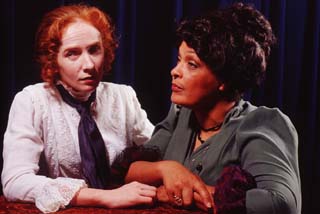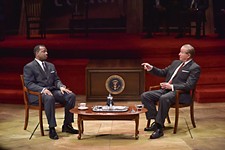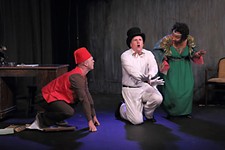Mrs. Warren's Profession
Local Arts Reviews
Reviewed by Robert Faires, Fri., March 28, 2003

Mrs. Warren's Profession
A Woman's Place
State Theater, through April 13
Running Time: 2 hrs, 10 min
Such a pretty picture: Mother holding infant daughter under a brilliant summer sky, a flock of sheep resting peacefully in the emerald field at their feet. Painted in the 1850s by Ford Madox Brown, Pretty Baa-Lambs is the epitome of maternal-filial harmony, domestic bliss in a pastoral paradise. But having a gargantuan re-creation of it loom over the English country-cottage setting in a production of Mrs. Warren's Profession is a wry touch that George Bernard Shaw himself might appreciate. For the mother and daughter he penned here come together about as peacefully as flint and rock, and the holiday cottage in Surrey notwithstanding, they have no more relationship to a world of bucolic splendor than they have relationship to each other.
Kitty Warren and her daughter Vivie share no bond because they've never shared a home. As Vivie was growing up, Kitty saw to it that her daughter was provided with money, shelter, education, everything she would need to grow into a successful woman ... everything, that is, except a mother. Mrs. Warren was an absent parent, spending her time tending to her business on the Continent, save for rare forays to England. Now, on one of those trips, Mrs. Warren finds her girl all grown and graduated from college, a woman in her own right. At long last, they come to learn about each other and the world that shaped them: no Garden of Eden but an urban jungle, an outgrowth of the Industrial Revolution and Victorian mores, with little use for women outside the home and little way for women to escape the grinding heel of poverty outside the workhouse or the whorehouse. Mrs. Warren's profession, it turns out, is the world's oldest, and that revelation sparks theatrical fire in the State Theater Company's scintillating revival.
Though daughter and mother could hardly look less alike here -- Derdriu Ring's sunny orange locks and fair pink skin stand in sharp contrast to the raven hair and mocha skin of Franchelle Stewart Dorn -- the two share a steely resolve that might easily be of the same bloodline. From the rolled-up sleeves of her plain cotton blouse, Ring's Vivie is clearly a woman who is ready to work -- to plunge her arms up to the elbow and get her hands dirty if need be. And when she stands and clasps those hands behind her back, she has the stance and demeanor of a general surveying the battlefield. Dorn's Kitty Warren may be outfitted in much more extravagant attire, all frills and peacock feathers, but she is no less confident or determined. Her eyes reveal a knowledge of the world, and when she shares the history of how that knowledge was obtained, her voice takes on the edge and heat of a blade fresh from the blacksmith's fire. Both are so luminously self-possessed that you can see why men flutter about them like moths around a candle.
Among the men we see here, Vivie's most ardent admirer is Frank Gardner, a young wastrel who charms his way into others' affections by playing the little boy. Guy Roberts animates him with a boy's love for games -- and an eye toward mischief; behind every line is the smirk of a scamp. Frank's competition is a gray-suited, gray-souled businessman, Sir George Crofts, who sees in Vivie a Victorian trophy wife. Initially, Paul Norton's Crofts is as starchy as his collar, but Norton proves him capable of blistering rage. These characters -- and the aesthete Mr. Praed, played charmingly by David Stahl, and Frank's bumbling cleric of a father, played with comic bluster by David Jarrott -- might be mere types, but the actors here fill in the spaces between philosophical pronouncements and plot requirements with the breaths and gestures and expressions of people who live.
That's the trick with Shaw: to move his characters beyond the politics for which they serve as mouthpieces. State Artistic Director Scott Kanoff and his skilled cast have accomplished that in spades, perhaps nowhere more clearly than when Vivie learns the truth about her mother's career. The scene crackles with the tension of opposing generations, with one person's urgent need for explanation and the other's equally urgent need to explain. The shock felt by Vivie and the vigor with which Kitty defends the choices she's made are expressed with the force of the deeply personal. We feel what's at stake for these women, not just in terms of a century past, in an age of repressed sexuality and before women had won the vote, but in terms of our time, when lap dances at a strip club or dirty talk over the phone offer more lucrative careers than the "honest" work of minimum-wage food service or retail, when Joe Millionaire and The Bachelor show women still eager to marry for money.
The production is lovely -- with Buffy Manners' sumptuous period costumes, Tony Tucci's handsome lighting, and Christopher McCollum's elegant set making a picture almost as pretty as Ford Madox Brown's painting -- but what Kanoff and his sterling production team do is something more than please the eye; they prick the mind and heart. They make things matter.










